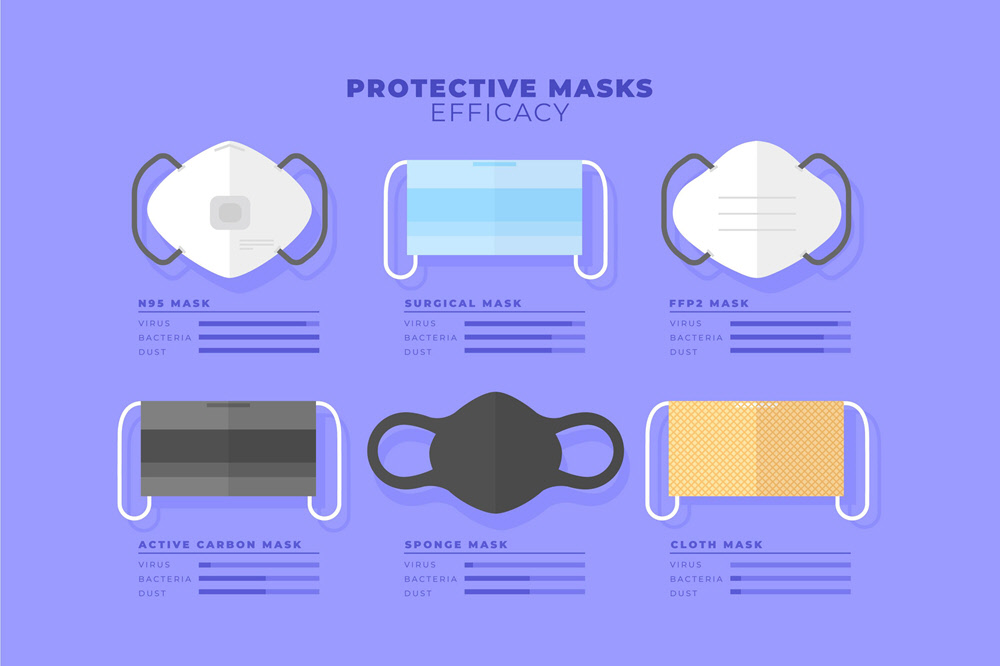General Health Tips & News
Comparison between Efficacy of Cloth Mask, Surgical Mask and N95 Mask
By S.I. (staff writer) , published on August 07, 2020

Medicine Telehealth Health coronavirus masks
Coronavirus is a hot topic these days. It causes a flu-like disease with respiratory symptoms [1] that currently has no available vaccine. Therefore, prevention is the best guard against it for now. Avoid touching your face, nose, and eyes. As it is a respiratory illness, masks can help prevent the disease and also make you touch your face less frequently.
Masks are available in different materials and fabrics with variable protective ability. They prevent particulate matter and pathogens from entering your body cavities by entrapping them. Cloth masks, surgical masks, and N95 masks are being commonly used for disease prevention. However, all of these masks differ in characteristics like pore size, filtration capacity, intended use, fitting, etc [2]. Here is a comparison between the efficacies of different types of masks.
Cloth Mask:
Cloth mask is the least effective of all in terms of preventing viruses and other small disease-causing agents from entering the body. Still, it is better than having nothing to cover your face. Although these masks are a loose fit and do not cover the face properly, can provide a little protection. But they are not recommended in high-risk cases. Home-made masks are stitched of different fabrics, having different pore sizes. Each fabric has a variable capacity to block particulate matter owing to pore size difference. Particles of size 30nm, 100nm, 500nm, 1, and 2.5 micrometre are 39% to 65% efficiently blocked by the cloth mask [3]. Its efficacy can be increased by putting on multiple layers.
Surgical Mask:
It is a 3 layered mask having 2 sides with far better protective ability as compared to cloth mask. Each side is meant to be for a different purpose. One side prevents the spread of the disease from an infected person and the other side guards a healthy individual from contracting the disease if he comes in contact with a diseased person. Therefore, you should decide the side to be used according to your health condition before wearing it.
Surgical masks can effectively block the droplets and particles from entering the body but still are less helping than N95 masks. It does not fit so tightly as an N95 respirator. They can block droplets but aerosols are smaller particles and can cross the mask causing disease [4].
N95 Mask:
It is proved to have maximum efficacy against coronavirus and even the smaller aerosols. It can block up to 95% of the airborne particles of various sizes as compared to 2% to 38% efficacy of home-made masks and 55% efficacy of medical masks. It fits your face tightly, diminishing the chances for some particles to set in your body and cause disease. As they are tightly fitted, there is an exhalation valve on the mask to ease the breathing process and reduce the production of humidity. These masks are recommended for health care providers worldwide because of the maximum protection provided. They are superior to both cloth and surgical face masks so far in terms of protective ability [5].
References:
- https://www.ncbi.nlm.nih.gov/books/NBK554776/
- https://www.fda.gov/medical-devices/personal-protective-equipment-infection-control/n95-respirators-surgical-masks-and-face-masks
- https://pubs.acs.org/doi/10.1021/acsnano.0c03252
- https://www.ncbi.nlm.nih.gov/pmc/articles/PMC7153751/
https://www.ncbi.nlm.nih.gov/pmc/articles/PMC5705692/
Find articles related to: Medicine Telehealth Health coronavirus masks
More articles about General Health Tips & News
Back to the Health Tips Index




